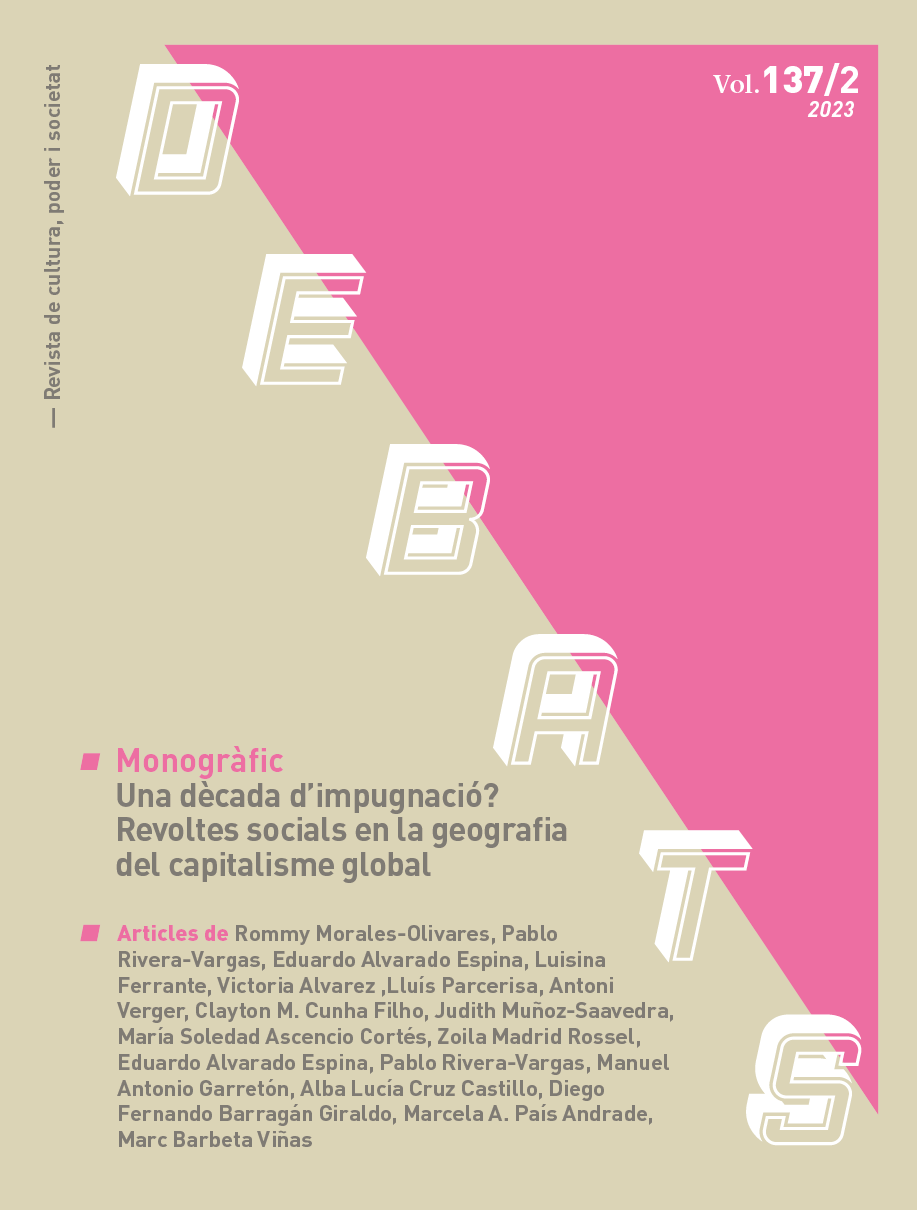Social revolt in Chile: a political counter-hegemony challenging neoliberalism?
DOI:
https://doi.org/10.28939/iam.debats-137-2.5Keywords:
neoliberalism, democracy, social movements, counter hegemony, cultural changeAbstract
On 18 October 2019, Chile began the biggest political and social upheaval since the massive protests against the Pinochet dictatorship. These protests gave way to a process of impeachment of the traditional institutions of the state. In this framework, this article addresses the political dimension of the social revolt and its scope in the constituent itinerary that was agreed on 15 November 2019. It seeks to answer the question of whether the great mass movement was the expression of a political counter-hegemony that challenged the neoliberal common sense. To do so, it draws on the main theoretical currents that question the fit between democracy and neoliberalism, especially Chantal Mouffe's agonistic proposal of the populist moment. In practical terms, it analyses, on the basis of past political and electoral behavior, two cleavages that could be identified with the emergence of the populist moment, that of elite/people and parties/independents. From the analysis of the electoral data of the last thirty years and put in relation to the results of the 2021 election of the members of the Constituent Convention, it is concluded that the expression of weariness is faithfully expressed in the two cleavages that define the populist moment. In addition, there is a strengthening of the various political forces that see themselves as anti-neoliberal.
Downloads
References
Alvarado Espina, E. (2017). La calidad de la democracia en España y Chile. Un estudio a partir de la desigualdad social y el elitismo político. Madrid: Universidad Complutense de Madrid.
Alvarado Espina, E. (2018). Una aproximación crítico-contextual al declive de la democracia en la era neoliberal. Revista Española de Ciencia Política (47): 69-91.
Alvarado Espina, E., Rivera Vargas, P., y Morales Olivares, R. (2019). Radicalizar la democracia desde los movimientos sociales. Los casos comparados de Podemos en España y el Frente Amplio en Chile. Izquierdas (47): 87-105. http://dx.doi.org/10.4067/S0718-50492019000400087
Bauman, Z. (2014). ¿La riqueza de unos pocos nos beneficia a todos? Barcelona: Paidós.
Boas, T. C., & Gans-Morse, J. (2009). Neoliberalism: From new liberal philosophy to anti-liberal slogan. Studies in comparative international development, 44(2), 137-161. https://doi.org/10.1007/s12116-009-9040-5
Dahl, R. (1997). Poliarquía. Participación y Oposición. Madrid: Alianza.
Dahl, R. (2012). La democracia. Barcelona: Ariel.
Deutsch, K. (1966). The Nerves of Government: Models of Political Communication and Control. New York: Free Press.
Foucault, M. (2012). El poder, una bestia magnífica . Buenos Aires: Siglo veintiuno.
Garretón, M. A. (2021). Del “Estallido” al Proceso Refundacional. El Nuevo Escenario de la Sociedad Chilena. Asian Journal of Latin American Studies, 34(2), 39-62.
Garretón, M. A. (2012). Las relaciones entre política y sociedad: Hacia una refundación. Mensaje, 61(611), 6-10.
Garrido-Vergara, L. (2020). Political, Social, and Cultural Capital in the Chilean Political Elite, 1990–2010. Latin American Politics and Society, 62(1), 121-141.
Harvey, D. (2007). Breve historia del neoliberalismo. Ediciones Akal.
Hayek, F. (1993). La desnacionalización del dinero. Madrid: Unión Editorial.
Hermet, G. (2008). El invierno de la democracia. Barcelona: Los libros del Lince
Huneeus, C., Lagos, M. y Díaz A. (2015). Los dos Chiles. Santiago de Chile: Catalonia.
Jörke, D. (2008). Post-democracia en Europa y América Latina. Revista de Sociología, (22). 141-156. https://doi.org/10.5354/0719-529X.2008.14488
Keane, J. (1992). Democracia y sociedad civil. Alianza Editorial.
Leiva, B. A. (2020). Estallido social en Chile: la persistencia de la Constitución neoliberal como problema. DPCE Online, 42(1), 2037-6677.
Madariaga, A. (2020). Neoliberal Resilience: Lessons in Democracy and Development from Latin America and Eastern Europe. Princeton: Princeton University Press.
Mayol, A. (2019). Big bang. Estallido social 2019: Modelo derrumbado-sociedad rota-política inútil. Editorial Catalonia.
Mouffe, C. (1999). Deliberative democracy or agonistic pluralism? Social research, 66(3), 745-758.
Mouffe, Ch. (2012). La paradoja democrática. El peligro del consenso en la política contemporánea. Barcelona: Gedisa.
Mouffe, Ch. (16 de junio, 2016). El momento populista. Véase en https://elpais.com/elpais/2016/06/06/opinion/1465228236_594864.html.
Mouffe, Ch. (2018). Por un populismo de izquierda. Buenos Aires: Siglo Veintiuno Editores.
Nun, J. (2003). Democracy: Government of the People or Government of the Politicians? Rowman & Littlefield.
Offe, C. (2014). The Europolis experiment and its lessons for deliberation on Europe. European Union Politics, 15(3), 430-441. https://doi.org/10.1177/1465116514532557
Schmitter, P. C. (2015). Crisis and transition, but not decline. Journal of Democracy, 26(1), 32-44. doi:10.1353/jod.2015.0004.
Stiglitz, J. E. (2011). Rethinking macroeconomics: What failed, and how to repair it. Journal of the European Economic Association, 9(4), 591-645. https://doi.org/10.1111/j.1542-4774.2011.01030.x
Parsons, T. (2013). The social system. Routledge.
Piketty, T. (2015). The economics of inequality. Harvard University Press.
Streeck, W. (2011). The Crisis of Democratic Capitalism, New Left Review, 71: 5-29.
Therborn, G. (1996). Child politics: Dimensions and perspectives. Childhood, 3(1), 29-44. https://doi.org/10.1177/0907568296003001003
Wolin, S. (2008). Democracy Incorporated. Managed Democracy and the Specter of Inverted Totalitarianism. New Jersey: Princeton University Press.
Wagner, P. (2012). Modernity: Understanding the Present. Cambridge: Polity Press.
Welzel, C., Inglehart, R., & Kligemann, H. D. (2003). The theory of human development: A cross‐cultural analysis. European Journal of Political Research, 42(3), 341-379.
Downloads
Published
How to Cite
Issue
Section
License
Without prejudice to the provisions of article 52 of Spanish Law 22/1987 of November 11 on Intellectual Property, BOE (official state bulletin) of November 17, 1987, and pursuant to said legislation, the author(s) surrender(s) free of charge its rights of edition, publication, distribution and sale of the article, for its publication in Debats. Journal on Culture, Power and Society.
Debats. Journal on Culture, Power and Society is published under the Creative Commons license system in accordance with the «Recognition - Non-Commercial (by-nc) modality: The generation of derivative works is permitted provided that commercial use is not made. Nor can the original work be used for commercial purposes».
Thus, when the author submits his/her contribution, he/she explicitly accepts this assignment of publishing and publishing rights. Authors also authorize Debats. Journal on Culture, Power and Society to include their work in an issue of the journal to be distributed and sold.











